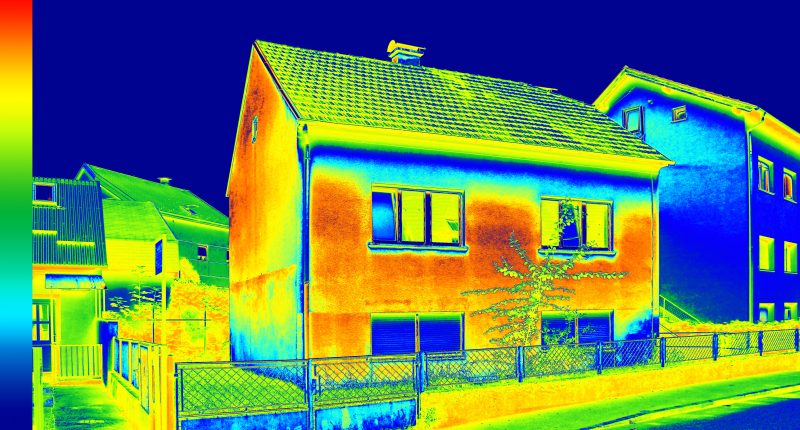PEOPLE who live in poorly insulated homes are paying considerably more towards their energy bill despite prices falling.
Homes with an energy performance certificate (EPC) score of F face paying substantially more than those rated C, even though energy bills fell on Monday.
Analysis from the Energy and Climate Change Intelligence Unit (ECIU) found that for these households face paying an extra £340 a year for gas and £260 a year for electricity.
An EPC rating tells you how energy efficient a building is, with A being the most efficient and G being the most inefficient.
F-rated homes are some of the leakiest homes in the country, meaning the heat produced by gas boilers quickly escapes the building.
They’re also unlikely to have double glazing or insulation.
Read more in money
The extra cost is when compared to homes with EPC ratings of C, which are considered reasonably well-insulated.
But even D-rated homes will face annual bills around 15% higher, the research found.
ECIU energy analyst Jess Ralston said: “For millions living in cold, leaky homes, insulation is crucial for lowering bills.
“But with energy independence remaining a top concern for the public and politicians alongside the cost of living, insulation is now also key to reducing our demand for gas.
Most read in Money
“Unless we start to use less gas, we’ll just have to import more from abroad as the North Sea continues its inevitable decline, regardless of new licences.”
What is an EPC rating?
ENERGY Performance Certificates (EPCs) tell you how energy efficient a building is and give it a rating from A (very efficient) to G (inefficient).
They’ll tell you how costly it will be to heat and light your property, and what its carbon dioxide emissions are likely to be.
An EPC also includes information on what the energy efficiency rating could be if you made the recommended improvements and highlights cost effective ways to achieve a better rating.
EPCs are valid for 10 years from the date of issue.
You can find your property’s EPC by visiting www.gov.uk/find-energy-certificate.
The ECIU said that a little over a decade ago there were considerably more homes being insulated every year in the UK.
The number of insulation measures has dropped 95% compared to the period before changes made by then-Prime Minister David Cameron.
In September, current Prime Minister Rishi Sunak scrapped plans that would have forced private landlords to ensure their properties had a minimum level of insulation.
A Department for Energy Security and Net Zero spokesperson said: “Nearly half of all homes in England now have an EPC rating of C or above, up from just 14% in 2010.
“We have allocated £20 billion for energy efficiency over this Parliament and next – helping cut bills for those families who need it most.
“Our investment will raise insulation standards of around 500,00 homes across the UK.”
However, hundreds of thousands of households may be able to get free or cheap insulation to help cut their energy bills.
GREAT BRITISH INSULATION SCHEME
You can get help insulating your home through the Government’s Great British Insulation Scheme.
The scheme is open to households in council tax bands A-E across England, Wales and Scotland.
You also must have an energy performance certificate rating of D or lower.
If you qualify, you could be in line for essential upgrades to your home, including roof, loft or cavity wall insulation – which could cut your annual energy bill by £100s.
Check whether you meet the eligibility criteria by visiting www.gov.uk/apply-great-british-insulation-scheme.
ENERGY COMPANY OBLIGATION SCHEME
Through the Energy Company Obligation (ECO) scheme, low-income and vulnerable families can receive help improving the energy efficiency of their homes.
Under the ECO scheme, suppliers have a legal obligation to implement energy-saving measures in your home.
Help is offered on a case-by-case basis, but it can mean having a new boiler fitted, or loft or cavity wall insulation put in, often for free.
The ECO was first launched in January 2013 and has been extended four times.
Not all energy companies are signed up to the ECO scheme. Here is the list of ones that are:
- British Gas
- E (Gas and Electricity) Ltd
- E.ON
- Ecotricity
- EDF
- Octopus Energy
- Outfox the Market
- OVO
- Scottish Power
- Shell Energy
- So Energy (including ESB Energy)
- The Utility Warehouse
- Utilita Energy
You only qualify for the ECO under certain circumstances, such as claiming certain benefits and living in private housing.
You also could be eligible if you live in social housing.
Also, just because you are eligible for the ECO scheme, that doesn’t mean you are guaranteed help.
Meanwhile, you may have to fund part of the energy-improving measures in your home.
You can apply by contacting either your local council or energy supplier.
SOCIAL HOUSING DECARBONISATION FUND
The government recently confirmed fresh funding to help thousands of homes with poor insulation and outdated heating systems are in line for upgrades.
It has boosted the Social Housing Decarbonisation Fund (SHDF) by £75million.
The funding will be offered to 42 councils and housing associations across England to help them co-fund installations in up to 8,000 homes.
Under the scheme, council houses will be retrofitted with wall and loft insulation, double glazing, heat pumps, and solar panels.
They will not be limited to one installation and could get their home insulated, have doors and windows upgraded to reduce heat leakage and cut their energy bills.
If eligible, those living in social housing will not need to do anything, as their housing provider will contact them.
Other households will need to check what their local authority has on offer, and they may need to apply for help.
Local authorities will deliver the funding in different ways.
Therefore, you will need to check directly with your council.
BOILER UPGRADE SCHEME
Meanwhile, through the Boiler Upgrade Scheme, you might be able to get a grant to help with the cost of installing a heat pump.
The grant was first launched in 2022 and was originally worth £5,000 or £6,000, depending on the type of heat pump.
But as heat pumps are typically expensive to purchase and install, costing between £5,000 and £8,000, the government boosted the grant in October to £7,500.
The grant can be used towards both air source heat pumps and ground source heat pumps.
Those wishing to install a biomass boiler can also apply for a £5,000 grant.
You must find an MCS-certified installer to claim the grant on your behalf.
MCS is the certification scheme for energy-efficiency product installers.
You can find the nearest ones to you by visiting www.mcscertified.com/find-an-installer, but it is worth shopping for a few quotes.
READ MORE SUN STORIES
Once you agree a price, the installer will apply for the grant and you will then be contacted by Ofgem, the energy regulator, to confirm that the work is being done on your behalf.
You must pay the difference if the pump costs more than the grant.
What energy bill help is available?
THERE’S a number of different ways to get help paying your energy bills if you’re struggling to get by.
If you fall into debt, you can always approach your supplier to see if they can put you on a repayment plan before putting you on a prepayment meter.
This involves paying off what you owe in instalments over a set period.
If your supplier offers you a repayment plan you don’t think you can afford, speak to them again to see if you can negotiate a better deal.
Several energy firms have grant schemes available to customers struggling to cover their bills.
But eligibility criteria varies depending on the supplier and the amount you can get depends on your financial circumstances.
For example, British Gas or Scottish Gas customers struggling to pay their energy bills can get grants worth up to £1,500.
British Gas also offers help via its British Gas Energy Trust and Individuals Family Fund.
You don’t need to be a British Gas customer to apply for the second fund.
EDF, E.ON, Octopus Energy and Scottish Power all offer grants to struggling customers too.
Thousands of vulnerable households are missing out on extra help and protections by not signing up to the Priority Services Register (PSR).
The service helps support vulnerable households, such as those who are elderly or ill, and some of the perks include being given advance warning of blackouts, free gas safety checks and extra support if you’re struggling.
Get in touch with your energy firm to see if you can apply.










